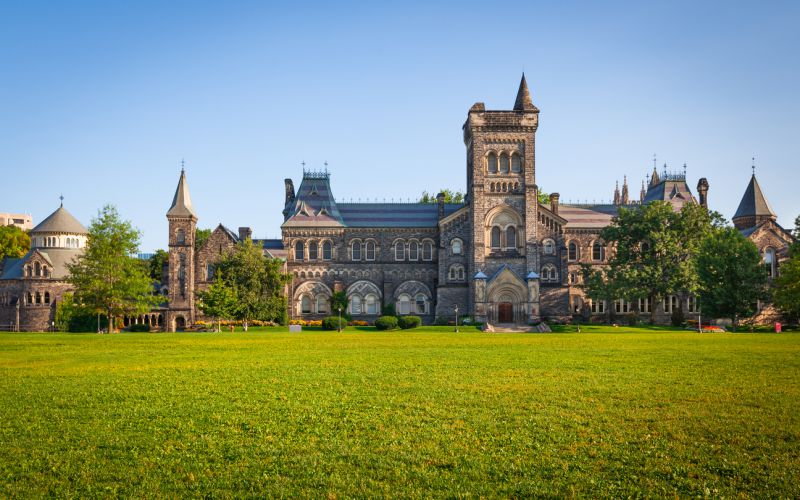Canada stands out as an educational global powerhouse, boasting premier higher learning institutions renowned for providing top-tier higher learning and ground-breaking research opportunities.
Canada is widely revered for its commitment to quality education, cultural diversity, and open atmosphere – something which draws students and researchers from around the globe – here we explore Canada’s most notable higher learning institutions to identify their specific strengths that contribute to academia, innovation and society as a whole.
Most Ranked Higher Institution In Canada
Below are some of the most ranked higher institutions in Canada.

1. University of Toronto
The University of Toronto stands out as a beacon for academic research excellence, boasting Nobel laureates and Rhodes Scholars among its faculty and alumni – making an indelible mark on global knowledge through innovative yet traditional academic values. A true gem on Canada’s academic landscape.
The University of Toronto (U of T) tuition fees depend on both the program selected and residency status.
For this current academic year, tuition fees at the University of Toronto for undergraduate students averaged $33,200 annually for Canadians and $59,400 annually for internationals; these fees differ from graduate student costs.
U of T graduate student tuition fees average $22,700 annually for Canadians and $48,300 annually for internationals.
Please be aware that these are average tuition fees, with individual costs depending on a student’s program and residency status. Furthermore, fees such as student union dues or technology charges may also apply.
2. McGill University
With its prime location in Montreal, McGill University strikes an elegant balance between tradition and innovation. Its bilingual environment fosters academic journeys full of cultural vibrancy allowing students to interact with diverse perspectives. McGill is widely acknowledged for research excellence as well as student involvement opportunities and medical breakthroughs that benefit local as well as global communities alike.
The McGill University tuition fees depend on both the program selected and residency status.
For this current academic year, tuition fees at McGill University for undergraduate students averaged $32,400 annually for Canadians and $51,600 annually for internationals; these fees differ from graduate student costs.
McGill University graduate student tuition fees average $27,800 annually for Canadians and $50,400 annually for internationals.
Please be aware that these are average tuition fees, with individual costs depending on a student’s program and residency status. Furthermore, fees such as student union dues or technology charges may also apply.
3. University of British Columbia
Set along Canada’s breathtaking west coast, the University of British Columbia (UBC) stands out not just as an idyllic backdrop – but as an epicenter for sustainability research and environmental education. UBC serves as an interactive living laboratory where students and researchers collaborate on global issues through experiential learning initiatives like its Center for Interactive Research on Sustainability – ultimately striving towards creating a greener future.
For undergraduate students at the University of British Columbia, Annual tuition costs for Canadian students is $31,600 while international students should anticipate paying $58,500 annually for tuition.
Average tuition fees for graduate students attending the University of British Columbia average approximately $21,700 annually for Canadian students while international students incur fees of $47,200 annually.
Please keep in mind that these tuition fees are just estimates; actual charges may differ based on your program choice and residency status.
4. University of Waterloo
Long considered “the Silicon Valley of the North”, University of Waterloo has emerged as a remarkable hub of innovation and entrepreneurship. Renowned for its co-op programs which combine classroom education with real-world experience, graduates of Waterloo are not simply theoretical thinkers but effective innovators – many even leading groundbreaking technological developments like quantum computing – further cementing Waterloo as a technological trailblazer.
UW tuition fees for undergraduate students for this academic year average around:
- Canadian students spend approximately $31,400 annually and international students spend an estimated 57,800 each year for tuition fees.
UW graduate students typically pay approximately $10,000 annually in tuition fees.
- Canadian students enrolled at Canadian institutions pay $24,200 annually while international students incur an annual tuition of $79,000 per year.
Please keep in mind that these tuition fees are just averages; actual charges may differ based on your chosen program and residency status.
5. University of Montreal
One of North America’s preeminent Francophone universities, the University of Montreal stands out as an intellectual hub committed to research and education in French. From arts to sciences; from cultural diversity promotion to global dialogues both French and English alike – its French-language framework promotes knowledge advancement while at the same time serving cultural diversity while encouraging global dialogues both French and English alike.
This academic year, average tuition fees for undergraduate students at University of Montreal are:
- Quebec Residents ($2,656 annually); Non-Quebes Canadian students from outside Quebec (10,673); International students (29,592).
Average tuition fees for graduate students attending University of Montreal:
- Residents of Quebec : $3,872 each year
Canadian students outside Quebec: $14,515 annually
and international students: 39,314.
Please keep in mind that these are simply average tuition fees and actual costs may differ based on a student’s program selection and residency status.
Canada is home to many acclaimed higher education institutions, each boasting its own distinct set of strengths that contribute to academia, research, and society. From incubating innovation and celebrating language diversity to training the leaders of tomorrow – Canada’s universities remain committed to producing thinkers and change-makers capable of meeting global challenges head-on.


